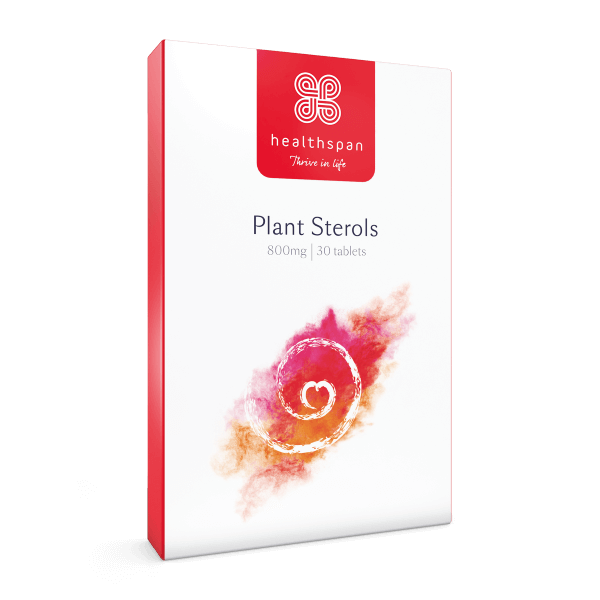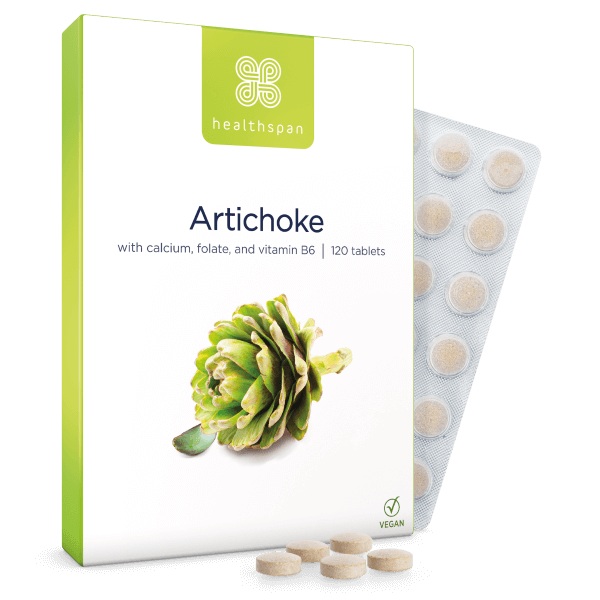First discovered in the 1950s, plant sterols include plant hormones like beta-sitosterol, campesterol and stimasterol. These are found in foods like vegetable oils, nuts, seeds, grains, fruit and vegetables, and have been shown to lower cholesterol.
🕒 5 min read
How do plant sterols work?
Sterols are the equivalent of animal cholesterol in the vegetable world. In fact, these substances so closely resemble cholesterol that they compete for the same receptors in the small intestine. Eating foods containing plant sterols, or taking supplements, can therefore block cholesterol absorption into the circulation to help reduce your cholesterol levels.
The cholesterol in your bloodstream comes from two main sources – that which you make in your liver (around 800mg per day) and that absorbed from your diet (typically around 300mg per day). Some of the cholesterol made in your liver is also delivered into the intestines via the bile, from which it is then reabsorbed into your circulation.
Plant sterols therefore block the absorption not just of dietary cholesterol but also of the cholesterol that is recycled from the bile. As a result, more cholesterol is voided via the bowels, along with most of the plant sterols. A large trial involving over 22,500 men and women living in Norfolk showed that people with the highest dietary intake of plant sterols have the lowest cholesterol levels, for example.1
Benefits of plant sterols
All the evidence has been reviewed and the nutrition and health claim has been authorised that plant sterols can lower blood cholesterol levels by:
- 7% to 10% at a daily intake of 1.5g to 2.4g plant sterols per day
- 10% to 12% with a daily intake of 2.5g to 3g per day
These effects are seen with 2 to 3 weeks of daily use.
The protective effects appear to be even more pronounced in people with type 2 diabetes. For example, one study showed they reduced LDL-cholesterol levels by 26.8% in people with type 2 diabetes, compared to a reduction of 15.1% in those without diabetes.2
By improving your cholesterol levels, following a sterol-enriched diet may help to reduce your risk of cardiovascular diseases such as hardening and furring up of the arteries, high blood pressure, heart attack and stroke.3 As a result, there is also an approved EU claim that a dose of 1.5g to 3g of plant sterols and plant stanol esters has been shown to lower/reduce blood cholesterol. High cholesterol is a risk factor in the development of coronary heart disease.
Recent research published in the Lancet Healthy Longevity has also shown that high levels of cholesterol in mid-life (below the age of 65) is also a risk factor in the development of dementia later on.

Plant Sterols 800mg
Proven to maintain or lower cholesterol
- Blocks the absorption of dietary cholesterol
- One tablet a day maintains normal cholesterol levels
- Three tablets a day (2.4g) lowers cholesterol levels
Supplement or food?
Although diet should always come first, it's difficult to obtain optimum amounts of sterols from food sources alone. The average omnivore diet provides 200mg - 400mg sterols per day, while following a vegetarian diet can provide up to 800mg per day.
In the Norfolk study mentioned above, for example, those with the lowest sterol intake obtained an average of just 178mg daily, while those with the highest intakes obtained an average of 463mg per day. For optimum benefits, intakes of at least 2g to 3g per day are needed. In addition, sterols in plant foods are naturally bound to fibre, which limits their action, unlike those found in supplements, which are more available to the body.
As well as eating a diet that favours healthy oils, nuts, seeds, fruit and vegetables, taking a plant sterol supplement is a useful solution for people with moderately raised cholesterol levels. Fortified foods such as yogurts and spreads that contain plant sterols or stanols are also available.
Plant sterols vs statins
Statins are the medical treatment of choice for lowering cholesterol levels. These drugs work by inhibiting a liver enzyme (HMG-CoA reductase) so that less new cholesterol is made and pushed out into your circulation. Because plant sterols work in a different way to statins, the two can be combined to lower cholesterol levels through a two-pronged approach.4 In fact, adding sterols to statin medication is more effective than doubling the statin dose.5
The combination of a statin plus a plant sterol supplement can therefore help to reduce the dose of statin needed, which may reduce the risk of statin side-effects (such as muscle aches and fatigue). Do check with your doctor before taking plant sterols, however, and never stop taking any medication without seeking medical advice.
Plant sterol dose
The optimum dose is 2g to 2.4g plant sterols per day. Do not take more than 3 grams per day in the form of supplements as there is no evidence of additional health benefits from taking larger amounts, and there is a possibility that higher doses may reduce the absorption of some fat-soluble vitamins and carotenoids (antioxidant plant pigments).6
Plant sterols side effects
No significant side effects have been reported when taking plant sterol supplements. A few people notice diarrhoea or fat in their motions. If this happens, reduce the dose of plant sterols and the amount of fat in your diet.
Plant sterols have been approved by the European Union Scientific Committee as safe for inclusion in functional foods.
Plant sterols are proven to maintain or lower cholesterol levels, but did you know that artichoke can also help?
Plant sterols block the absorption of cholesterol in the gut, while artichoke reduces how much cholesterol is synthesised in the liver. What's more, it lowers 'bad' LDL cholesterol, while raising 'good' HDL cholesterol.
One study found that taking artichoke extracts for 6-12 weeks could lower cholesterol levels between 4.2% and a huge 18.5%, and increase 'good' HDL-cholesterol to keep levels in balance.

Artichoke Extract
Supports digestion and liver health
- 360mg artichoke extract with 7.2mg cynarin per tablet
- Extracted from the stems and leaves of the plant
- Added calcium for digestion and vitamin B6 for metabolism







